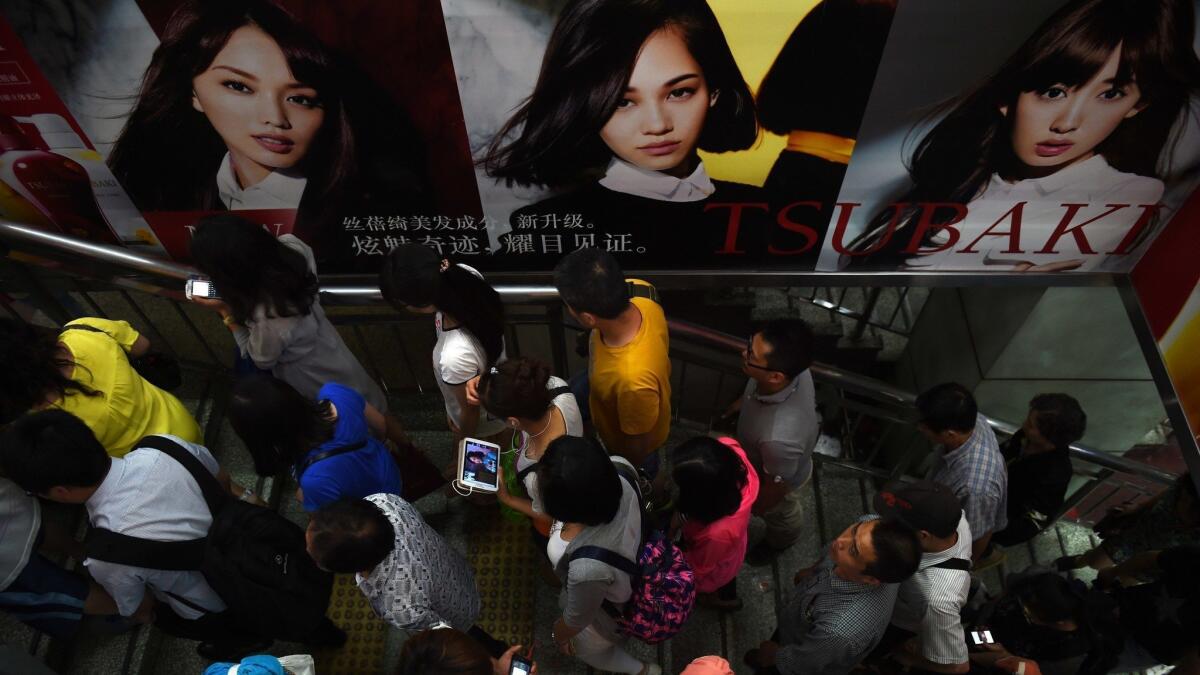China’s start-ups advertise for ‘good-looking’ tech workers

A year ago, China’s largest technology companies were lambasted for posting job ads seeking male employees that touted “good-looking” female workers to try to lure coders. The giants scrubbed their posts in response.
Yet the next generation of China’s tech superstar wannabes apparently haven’t gotten the message.
On the country’s two largest job websites — Liepin and Zhaopin — thousands of ads for internet companies use language that suggests bias based on appearance, gender or age. Some ask candidates to “have presentable facial features” or be “under the age of 30.” More than 1,000 postings used beauty as bait, with many boasting that they employ “good-looking men and women.”
The prevalence of the posts highlights the challenges China faces in enforcing fair hiring practices. This approach to filling tech positions contrasts with President Xi Jinping’s pledge to fight against workplace discrimination as the workforce shrinks.
“Chinese tech companies are falling behind Western peers and need better awareness of equal opportunity and more clearly defined policies banning discrimination,” said Wang Yaqiu, a researcher at Human Rights Watch, a nonprofit group that has conducted studies about the issue in China. “Discriminatory practices can be even worse at smaller companies because they lack the scrutiny that publicly traded companies are under.”
Liepin and Zhaopin don’t generate the job listings, instead acting as conduits in publicizing positions. Liepin didn’t respond to email queries to its investor relations unit’s email address. Zhaopin said in an emailed statement that it doesn’t allow discriminatory terms in recruitment ads.
Zhaopin also said it has made efforts to check posted ads and to ensure they don’t violate related laws in China, adding that job seekers can flag violations.
The ads from the start-ups come after Alibaba Group Holding Ltd., Tencent Holdings Ltd. and Baidu Inc., the powerhouses of China’s internet, were criticized for posting jobs open only to men. They removed the ads, with Tencent and Baidu apologizing. Alibaba said it implements strict policies on equal opportunity.
China bans job discrimination based on gender and stipulates the importance of equal opportunity. Yet a lack of enforcement means there are few repercussions for discriminatory hiring practices.
Many of the job posts are for programmers, assistants or administrative staff. Job postings for Shanghai-based IZhaohu, a hiring platform for on-demand nurses, requested that applicants have “presentable facial features” for nursing positions.
IZhaohu didn’t respond to email queries for comment sent to the general address on its website.
“Even though looks seemingly are irrelevant, Chinese internet companies like to use these catchphrases a lot,” said Lion Niu, a Beijing-based senior consultant at headhunter CGL Consulting. “In some divisions that are male dominant, companies still think by hiring a woman, they can boost morale for the coders.”
Companies still use beauty as bait. LAIX, a $600-million online education platform also known as Liulishuo, said in its ad that the company had “foreign and Chinese beauties and hunks” in trying to hire software engineers. LAIX said the language it used was in no way trying to discriminate based on looks, but sought to emphasize that the company is an international outfit with vitality. The company said it would change the language in its ads and has been working toward equal opportunity in the workplace.
UniCareer, an online education platform, said in its ads that it has so many beauties working there that “they were as numerous as clouds in the sky.” UniCareer didn’t respond to queries to its general email addresses.
Providing more job opportunities for women could result in economic benefits for China. That nation could add as much as $2.6 trillion to annual GDP by 2025, a 13% jump, by improving gender parity to match the best in the Asia Pacific region, according to a 2018 report by McKinsey & Co. Although China has a relatively high female-to-male labor-force participation ratio, the proportion of women in leadership positions remains low, the report said.
“Overall, there has been no substantial advance in women’s equality in recent years,” according to the McKinsey report. “China can build on its emerging strength in women’s entrepreneurship in the e-commerce and technology sectors to continue to encourage more women into professional and technical fields and into leadership positions.”
While gender equality has a long way to go worldwide — globally men hold 62% of management positions — it’s the blatant bias in hiring in China that stands out.
Much is also rooted in culture. Even today, Chinese companies and investors bond over drinking in karaoke parlors accompanied by female escorts. While bigger firms are starting to clean up their act and implement best practices, smaller companies — often fixated on growth and expansion — are unapologetic about age preferences, Niu said.
When it comes to age discrimination, China’s tech industry isn’t alone. Silicon Valley is often criticized for the idealization of youth. In China, though, the bias begins even younger, with the cutoff age sometimes topping out at 25. And those companies are notorious for taxing workdays that demand a so-called 996 schedule: 9 a.m. to 9 p.m., six days a week.
Aukey, an e-commerce operator in Shenzhen, limited applications for its platform operations to those ages 20 to 25. Food Leader, a grocery delivery company founded by ex-Alibaba and Tencent employees, restricted hiring for its grocery-selection operations manager to those ages 25 to 30. Aukey and Food Leader didn’t respond to email queries to their general email addresses and phone lines.
“When companies don’t get punished or don’t get sufficiently punished for discriminatory practices there’s little incentive for them to have greater awareness,” Wang said. “China needs a better enforcement mechanism.”






